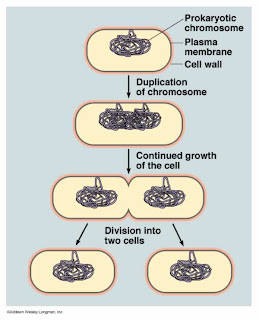P. 243 #1-5
1. Two reasons as to why cells divide is that the larger a cell becomes the more demands the cell places on its DNA, and the more trouble the cell has moving enough nutrients and wastes across the membrane.
2. A cells DNA are like books in a library because a larger cell needs to make greater demands on its available genetic "library", just like libraries need to keep their stocks of books up to keep customers happy.
3. The solution to the problem caused by cell growth, would be by having the volume increase much more factor than the surface area so that the ratio of surface area to volume decreases.
4. As a cell increases in size the volume increases much more rapidly than its surface.
5. Calculate the surface area , volume, and ratio of surface area to a cube with the length of 4 cm.
surface area: 4x4x16= 256 squared
volume: 4x4x4= 64 squared
Surface area to Volume: 256/64= 4:1
P.249 #1-6
1. The main events of the cell cycle are the phases M,S, G1, and G2.
2. The four phases of mitosis:
Prophase- The chromatin condenses into chromosomes. The centrioles separate, and a spindle begins to form. The membrane breaks down.
Metaphase- The chromosomes line up across the center of the cell. Each chromosome is connected to a spindle fiber at its centromere.
Anaphase- The sister chromatids separate into individual chromosomes and are moved apart.
Telophase- The chromosomes gather at opposite ends of the cell and lose their shapes. Two new nuclear membranes form.
3.Interphase- is the period of growth it's also known as an "in between" time.
4. Chromosomes are made of DNA.
5. Prokaryotic cells divide by using a cell plate that forms midway between the divided nuclei. The cell plate develops into a separating membrane.
6. Cytokinesis in plants cells are similar to cytokinesis in animal cells because they are both pushed into two different parts. However, they're different because in plant cells a cell plate is used while in animal cells thee isn't.
P. 252 #1-5
1. The chemicals that help regulate the cell cycle:
External regulators- Direct cells to speed up or slow down the cell cycle.
Internal regulators- Proteins that respond to events inside the cell.
2. Tumors can happen when cells don't respond to the signals that normally regulate their growth.
3. The cells respond to other cells by binding to them and growing more.
4.Cancer can be considered a disease of the cell cycle because the damages of it causes the cells to lose the information needed to reply to signals that would originally control their growth.
5.If cyclin were injected into a cell that was in mitosis, then it would control and regulate the timing of mitosis, because that's the main job of cyclin.
P. 257 #1-10
1.D- Surface area
2.C- 2 daughter cells
3.B- Centromere
4.C-12
5.C- Chromatid
6.B- anaphase
7.C
8.B- Cyclins
9.A- Speed up or slow down the cycle
10.A- Cancer
Tuesday, January 8, 2008
Friday, January 4, 2008
Cyclin
Cyclin: One of a family of closely related proteins that regulate to the cell cycle in in eukaryote cells.
Telophase
Anaphase
Metaphase
Prophase
Subscribe to:
Comments (Atom)










